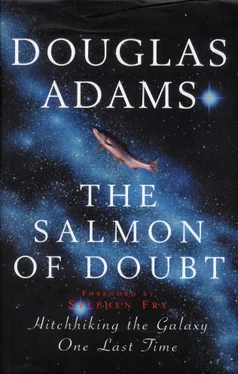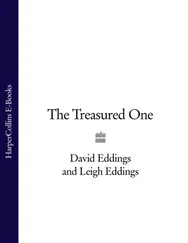Geoffrey Perkins, head of comedy at BBC television, was the producer of the radio version of Hitchhiker. He remembers first coming across Adams when he directed a Footlights show. “He was being heckled by a cast member, and then he fell into a chair. I next came across him when he was trying to write sketches for the radio show Weekending, then regarded as the big training ground for writers.
Douglas was one of those writers who honourably failed to get anywhere with Weekending. It put a premium on people who could write things that lasted thirty seconds, and Douglas was incapable of writing a single sentence that lasted less than thirty seconds.”
Hitchhiker was the last throw of the dice, but in retrospect the timing was absolutely right. Star Wars had made science fiction voguish, and the aftermath of Monty Python meant that while a sketch show was out of the question, there was scope to appeal to the same comic sensibility.
Python Terry Jones heard the tapes before transmission and remembers being struck by Adams’s
“intellectual approach and strong conceptual ideas. You feel the stuff he is writing has come from a criticism of life, as Matthew Arnold might say. It has a moral basis and a critical basis that has a strong mind behind it. For instance, John Cleese has a powerful mind, but he is more logical and analytical.
Douglas is more quirky and analytical.” Geoffrey Perkins agrees, but remembers there was little grand plan behind the project. “ Douglas went into it with a whole load of ideas but very little notion of what the story would be. He was writing it in an almost Dickensian mode of episodic weekly installments without quite knowing how it would end.” By the time the series aired in 1978, Adams says, he had put about nine months’ solid work into it and had been paid one thousand pounds. “There seemed to be quite a long way to go before I broke even,” so he accepted a producer’s job at the BBC but quit six months later when he found himself simultaneously writing a second radio series, the novel, the television series, and episodes of Doctor Who. Despite this remarkable workload, he was already building a legendary reputation for not writing. “I love deadlines,” he has said. “I love the whooshing noise they make as they go by.”
Success only added to his ability to prevaricate. His publishing editor, Sue Freestone, quickly realised that he treated writing as performance art, and so she set up her office in his dining room. “He needs an instant audience to bounce things off, but sometimes this can weirdly backfire. “There was a scene early in one book when he talked about some plates with, very definitely, one banana on each. This was obviously significant, so I asked him to explain. But he liked to tease his audience and he said he’d tell me later. We eventually got to the end of the book and I asked him again, ‘Okay, Douglas, what’s with the bananas?’ He looked at me completely blankly. He had forgotten all about the bananas. I still occasionally ask him if he has remembered yet, but apparently he hasn’t.”
Writer and producer John Lloyd has been a friend and collaborator with Adams since before Hitchhiker.
He remembers the “agonies of indecision and panic” Adams got into when writing. “We were on holiday in Corfu with three friends when he was finishing a book, and he ended up taking over the whole house.
He had a room to write in, a room to sleep in, a room to go to when he couldn’t sleep, and so on. It didn’t occur to him that other people might want a good night’s sleep as well. He goes through life with a brain the size of a planet, and often seems to be living on a different one. He is absolutely not a malicious person, but when he is in the throes of panic and terror and unable to finish a book, everything else pales into insignificance.” However the work was dragged out, it was extremely popular. The books all became bestsellers, and Adams was given an advance of over $2 million by his American publishers. He wrote a hilarious spoof dictionary with John Lloyd, The Meaning of Liff, in which easily recognised concepts, such as the feeling you get at four in the afternoon when you haven’t got enough done, were given the names of towns—Farnham being the perfect choice for this low-grade depression. In the late eighties he completed two spoof detective novels featuring Dirk Gently. For all his facility with humour, Freestone says she has been touched by how profoundly Adams’s work has connected with some readers. “In Hitchhiker, all you have to do to be safe is have your towel with you,” she explains. “I heard about this woman who was dying in a hospice who felt she would be fine because she had her towel with her. She had taken Douglas’s universe and incorporated it into her own. It embarrassed the hell out of Douglas when he heard about it. But for her it was literally a symbol of safety when embarking on an unknown journey.” There are serious themes within his work. The second Dirk Gently novel can easily be read as being about people who are homeless, displaced, and alienated from society. “His imagination goes much deeper than just cleverness,” says Freestone. “The social criticism is usually buried by the comedy, but it’s there if you want to find it.”
“I felt like a mouse in a wheel,” he says. “There was no pleasure coming into the cycle at any point.
When you write your first book aged twenty-five or so, you have twenty-five years of experience, albeit much of it juvenile experience. The second book comes after an extra year sitting in bookshops. Pretty soon you begin to run on empty.”
His response to running out of fuel was to attempt some “creative crop rotation.” In particular, his interest in technology took off, as did a burgeoning passion for environmental issues. In 1990 he wrote Last Chance to See. “As is the way of these things, it was my least successful book, but is still the thing I am most proud of.”
The book began when he was sent to Madagascar by a magazine to find a rare type of lemur. He thought this would be quite interesting, but it turned into a complete revelation. His fascination with ecology led to an interest in evolution. “I’d been given a thread to pull, and following that lead began to open up issues to me that became the object of the greatest fascination.” A link at the bottom of his e-mails now directs people to the Dian Fossey Trust, which works to protect gorillas, and Save the Rhino. Adams was also a signatory to the Great Ape Project, which argued for a change of moral status for great apes, recognising their rights to “life, liberty, and freedom from torture.” He was a founding member of the team that launched Comic Relief, but he has never been a hairshirt sort of activist. The parties he held at his Islington home would feature music by various legendary rock stars—Gary Brooker of Procol Harum once sang the whole of “A Whiter Shade of Pale,” including all the abandoned verses—and were peopled by media aristocracy and high-tech billionaires. Slightly less orthodoxly—for an enthusiastic, almost evangelical atheist—he would also host carol services every Christmas. “As a child I was an active Christian. I used to love the school choir and remember the carol service as always such an emotional thing.” He adds Bach to the Beatles and the Pythons in his pantheon of influences, but how does this square with his passionate atheism? “Life is full of things that move or affect you in one way or another,” he explains. “The fact that I think Bach was mistaken doesn’t alter the fact that I think the B-minor Mass is one of the great pinnacles of human achievement. It still absolutely moves me to tears to hear it. I find the whole business of religion profoundly interesting. But it does mystify me that otherwise intelligent people take it seriously.” This attachment to traditional structures, if not traditional beliefs, is carried over in the fact that his daughter, Polly, who was born in 1994, has four non-godparents. Mary Allen is one of them, and it was she who introduced Adams to his wife, the barrister Jane Belson. Allen says, “In the early eighties Douglas was going through some writing crisis and was ringing me every day. I eventually asked him whether he was lonely. It seemed that he was, so we decided he needed someone to share his huge flat. Jane moved in.” After several false starts, they married in 1991 and lived in Islington until last year, when the family moved to Santa Barbara.
Читать дальше










